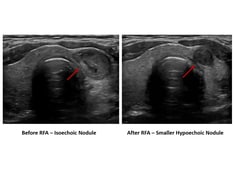High and high-normal levels of the thyroid hormone free thyroxine (FT4) were associated with atherosclerotic cardiovascular morbidity and mortality among middle-aged and elderly individuals, independently of cardiovascular risk factors, in a new study[1].
The findings suggest that measuring FT4 could be a predictive marker of atherosclerotic mortality. They also highlight the importance of identifying the modifiable mediators of the association between thyroid function and atherogenesis, the researchers suggest.
The results were published October 31, 2017 in Circulation Research.

Dr Arjola Bano
"Despite advances in prevention and treatment, atherosclerotic diseases remain a leading cause of mortality worldwide. Against this background, identifying additional modifiable risk factors for atherosclerosis is of major importance," lead author Dr Arjola Bano (Erasmus Medical Center, Rotterdam, the Netherlands) told theheart.org | Medscape Cardiology.
"So far, the role of thyroid hormones on atherosclerosis remains unclear. Therefore, we investigated the relationship of thyroid function with atherosclerosis throughout its spectrum, from subclinical atherosclerosis to overt disease to death," she said.
Recent papers, for example, have linked elevated thyroxine levels to increased risk for atrial fibrillation and sudden cardiac death.
Bano and colleagues analyzed data from 9420 community-dwelling individuals (average age 65 years, 57% female) who were part of the Rotterdam Study, a prospective population-based cohort study that investigates chronic diseases in people aged 45 and older.
They measured two types of thyroid hormone—thyroid-stimulating hormone (TSH) and free thyroxine (FT4)—and evaluated the link between these thyroid hormones and subclinical atherosclerosis, atherosclerosis-related cardiovascular events, and deaths.
The presence of subclinical atherosclerosis was defined as a coronary artery calcification (CAC) score >100 AU.
The researchers also accounted for the possible influence of age, sex, body-mass index, total cholesterol, triglycerides, systolic blood pressure, diabetes, alcohol and tobacco intake, and the use of antihypertensive and lipid-lowering drugs.
Study participants were followed for a median of 8.8 years (interquartile range 4.5–11.8 years). During this time, there were a total of 934 incident atherosclerosis-related cardiovascular events (incidence rate 12.6 per 1000 person years) and 612 atherosclerosis-related cardiovascular deaths (incidence rate 7.9 per 1000 person-years)
Analysis of the data showed that increasing FT4 levels were associated with:
More than twice the odds of having high CAC scores (odds ratio [OR] 2.28, 95% CI 1.30–4.02).
An 87% greater risk of suffering an atherosclerosis-related cardiovascular event (hazard ratio [HR] 1.87, 95% CI 1.34–2.59).
More than double the risk of atherosclerosis-related cardiovascular death, which increased in a linear manner with higher FT4 levels (HR 2.41, 95% CI 1.68–3.47 per 1 ng/dL) and lower TSH levels (HR 0.92, 95% CI 0.84–1.00 per 1 logTSH).
"Our findings suggest that healthcare providers should be careful to not overtreat the patients taking thyroid-hormone–replacement therapy," Bano said.
"Also, our findings suggest that people with low-normal FT4 levels have a lower risk of atherosclerotic cardiovascular morbidity and mortality compared with those with high-normal FT4 levels. However, our findings need to be replicated in other similar populations as well as in other ethnicities and younger populations," she said.
"Future studies are needed to provide further insights into the effects of thyroid hormones on overall health," she added.
The study was supported by the Erasmus Medical Center and Erasmus University of Rotterdam; the Netherlands Organization for Scientific Research; the Netherlands Organization for Health Research and Development; the Research Institute for Diseases in the Elderly; the Netherlands Genomics Initiative; the Ministry of Education, Culture, and Science; the Ministry of Health Welfare and Sports; the European Commission (DG XII); and the Municipality of Rotterdam. Bano reports no relevant financial relationships. Disclosures for the coauthors are listed in the paper.
For more from theheart.org | Medscape Cardiology, follow us on Twitter and Facebook.
Medscape Medical News © 2017
Cite this: High Thyroid-Hormone Levels Linked to Increased CVD Mortality - Medscape - Nov 14, 2017.











Comments